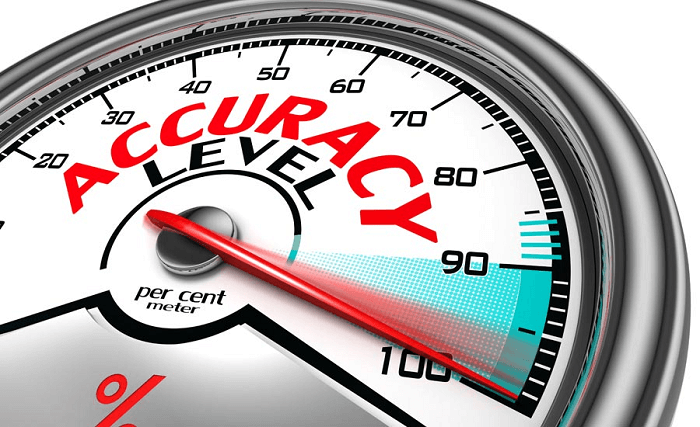Accuracy DefinitionThe term "accuracy" describes how precise or correct a measurement, analysis, or outcome is. Science, engineering, health, finance, and several other fields depend on this idea. When evaluating the performance or efficacy of systems, models, or data, accuracy is frequently used to gauge their quality, suitability, or reliability.  Importance in Various Fields- Accuracy is crucial in engineering to ensure that systems, structures, and products satisfy their performance criteria and design requirements. For instance, a machine's performance, effectiveness, and longevity can be impacted by the precision of a mechanical system like a gear or bearing. The accuracy of a sensor or actuator may impact a control system's precision and responsiveness.
- Accuracy is essential in medicine to guarantee that prognoses, therapies, and diagnoses are founded on accurate data. For example, the accuracy of a checkup, such as a blood test or a genetic test, might impact the efficiency of a diagnosis. The precision of medical equipment such as a pacemaker, ventilator, or artificial joint can impact the safety and efficacy of therapy.
- Accuracy is crucial in finance to guarantee that financial statements, projections, and modeling are founded on accurate and trustworthy data. For instance, the credibility and openness of a firm's financial performance may be impacted by the accuracy of financials like financial statements, cash flows, and balance sheets. The decision-making and risk-management processes of investors, lenders, & managers may be impacted by the accuracy of financial predictions, including revenue projections, sales forecasts, and expense estimates.
- Accuracy is essential in scientific study, for example, to ensure that the data & results collected are genuine and dependable. Research results might be erroneous without accuracy, resulting in bad assumptions, conclusions, and recommendations.
Any measurement, computation, or conclusion that aims to be trustworthy, legitimate, and helpful must generally be accurate. Accuracy is sometimes associated with precision, which refers to the level of consistency or reproducibility of a test or outcome. For instance, measurements that are accurate but not exact could be very accurate, but they might not be reliable or repeatable. In contrast, measurements that are exact but unreliable could be highly consistent, but they might not be valid. Benefits of AccuracyIn many areas of life, accuracy is crucial, and it offers several advantages. Some of the main advantages of accuracy are as follows: - Reliability: Accuracy guarantees data, information, and results reliability and trustworthiness. This is crucial in industries like research, health, engineering, and finance, where precision is crucial for decision-making.
- Efficiency: Having accurate information minimizes the need to examine or double-check data, which may be time-consuming and expensive, leading to more efficient decision-making.
- Safety: Accuracy is essential for guaranteeing safety in professions like engineering and medicine. Precise measurements and computations can shield people from harm and save mishaps.
- Credibility: Correct information helps to increase credibility and fosters a sense of confidence. This is crucial in sectors where reputation is maintained by accuracy, including journalism and academic research.
- Cost savings: Accuracy may result in cost savings by avoiding waste and mistakes in industries like manufacturing and logistics.
- Reputation: Accuracy may improve reputation since it shows care for the little things, thoroughness, and a dedication to excellence.
- Decision Making: Correct information facilitates better decision-making, which may result in improved results across a variety of sectors.
Accuracy is crucial for trustworthy, effective, safe, and credible decision-making and for saving costs and enhancing reputation. These benefits underline how crucial accuracy is in various spheres of life. Stages in the Accuracy Process-The procedures taken to evaluate the correctness of a measurement, computation, or forecast are often referred to as the accuracy process. The following are some standard steps in the accuracy process: - Clearly define objective: Before beginning any measurement or computation, it is crucial to define the purpose, the required level of precision, and the variables being considered.
- Choose the proper tools: Measurement instruments and equipment should be suitable for the degree of accuracy necessary. For instance, if great accuracy is desired, a more accurate measuring device may be required.
- Plan the process: Design the measurement or computation process, taking into consideration any elements that might affect accuracies, such as the environment, the equipment's calibration, or the existence of interferences.
- Take measurements or compute: Take measurements or compute by the intended technique, paying strict attention to details & preventing mistakes. Take note of every observation and measurement.
- Verify the outcomes: Confirm the correctness of the outcomes by evaluating them to established benchmarks, repeating tests, or using other techniques.
- Analyze & interpret the outcomes: Analyze & interpret the results from the perspective of the original aim. Determine possible causes of inaccuracy and make modifications if the findings fall short of the intended degree of accuracy.
- Communicate the results: Share the measurement or calculation's findings along with any sources of uncertainty or accuracy restrictions if necessary.
These procedures may be used to guarantee measurement and computation reliability and accuracy, which is crucial for making wise judgments and legitimate findings. The ConclusionWe can conclude that accuracy is important in a variety of sectors. Thus, aiming for the maximum degree of accuracy possible while measuring and estimating is imperative. To provide accurate findings, accuracy demands careful consideration of each detail, rigorous technique, and precision in measurement. It is also crucial to take causes of error and uncertainty into account.
|
